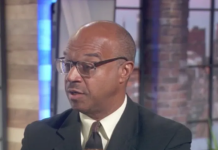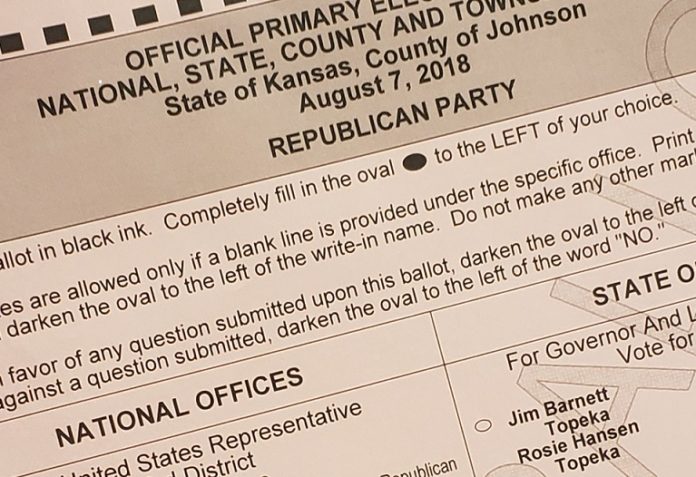(UPDATED: Includes late Thursday afternoon response from the secretary of state)
Voting rights activist Davis Hammet is going to court to force Secretary of State Scott Schwab to make public the names of voters who cast provisional ballots during the 2018 general.
The American Civil Liberties Union filed a lawsuit on Davis’ behalf in Shawnee County District Court asking a judge to order Schwab to provide the data, including the voter’s registration ID, full name, address and reason for their ballot’s rejection.
Hammet argued that timing is critical since the secretary of state’s voter data base will delete the 2018 data as the upcoming election approaches.
“Nonetheless, Defendant Kansas Secretary of State Scott Schwab has refused to provide the information responsive to plaintiffs’ request — claiming that it is exempt from disclosure under the Kansas Open Records Act,” the lawsuit states.
“Plaintiffs will be unable to assist voters in curing the defects that led to their 2018 ballots being rejected before the upcoming August 2020 primary.
“Moreover, Plaintiffs will likely lose access to this data forever as (the data base) updates voter records for the 2020 primary.”
Schwab denied the request, saying that federal law creates an exemption to the state’s open records statute and because there is a constitutional right to informational privacy about whether a voter cast a provisional ballot, the lawsuit says.
Schwab issued a response late Thursday afternoon
“Our office tried to find an agreeable solution with these organizations to fulfill their request while also protecting the private ballot information of Kansas voters,” Schwab said in a statement.
“In a typical ACLU about face, they, once again, chose to promote their own interests over the serious privacy considerations of Kansans.
“We will not break the law, allow for the disclosure of personal information to target voters or compromise voter privacy at the demand of litigation obsessed activist organizations.”
The issue has been percolating since last year when Hammet started requesting provisional ballot information in all 105 Kansas counties from the 2018 general election.
Hammet said the data is part of the voter file and is open record under state and federal law.
He said some counties provided the information, although he conceded officials took some time to evaluate whether it complied with the open-records law.
The lawsuit makes that point, noting that a number of counties have already interpreted the law so that the records are public.
“Douglas, Johnson, Sedgwick, Shawnee, and Wyandotte counties have all shared their lists of provisional ballot voters in response to open records requests— and more than 60 counties have taken the position that the type of ballot cast by voters is open to the public,” the lawsuit states.
Last year, Republican state Rep. Boyd Orr of Fowler asked the attorney general to review the legality of Hammet’s open-records request.
Orr said last year that he believed that the law governing provisional ballots could be interpreted different ways.
His letter to the attorney general points to a provision in state law that prohibits “disclosing or exposing the contents of any ballot, whether cast in a regular or provisional manner, or the name of any voter who cast such a ballot.”
While the public may be allowed to inspect voter registration books or other voter lists, “it appears that disclosure of the specific reason(s) as to why an individual voter’s provisional ballot was rejected may be beyond the scope of this provision,” Orr wrote.
However, Orr pointed out that in January 2019, a Johnson County judge ordered the Johnson County election commissioner to comply with the open-records law and make available a list of the voters who cast provisional ballots in the August 2018 primary.
Orr wanted to know whether the information sought by Hammet was exempt from disclosure under state law or whether the Johnson County judge’s ruling makes the information public.
“It seems to me the statutes are very conflicting,” Orr said in an interview. “I think I can find a statute that says we should, and I think I can find a statute that says we cannot.
Federal law says access to information about an individual provisional ballot shall be restricted to the person who cast the ballot.
A federal judge found in 2012 that the federal statute protected “access to information about an individual provisional ballot.”
The judge, however, said it did not protect information “about the individual casting the ballot.”
The judge ruled in that case that former state Rep. Ann Mah could have access to the names of the voters who cast provisional ballots.
However, the judge noted that Mah was not requesting information about ballot content or the reason voters cast a provisional ballot.
Hammet said he is gathering the information to better understand how provisional ballots are handled in Kansas.
He wants to know whether local election officials are following the law and that Kansans aren’t being wrongly disenfranchised.
He also wants to use the data to find and help people who weren’t allowed to vote because they didn’t have identification.













